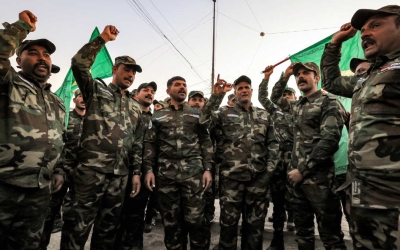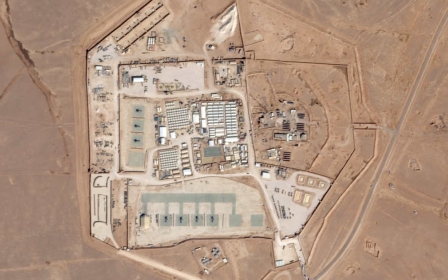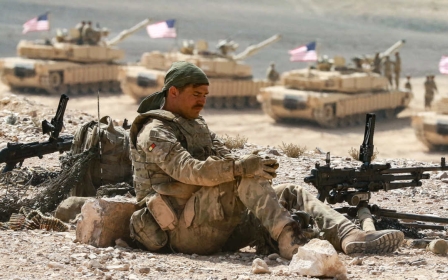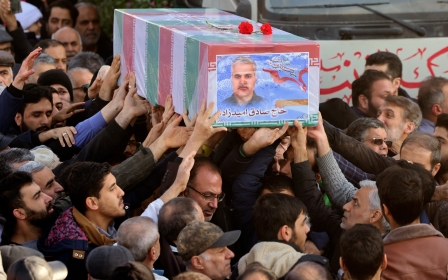US strikes on Iran-backed groups leave dozens dead in Iraq and Syria

At least 23 people have been killed after the United States on Friday evening launched its first series of retaliatory strikes against Iran-backed groups in Iraq and Syria, following a drone strike on an American outpost in Jordan that killed three soldiers.
US Central Command (Centcom) released a statement saying its forces struck more than 85 targets in Iraq and Syria, targeting the Quds Force of Iran's Islamic Revolutionary Guard Corps in addition to other affiliated armed groups in the two countries.
"Iran's Islamic Revolutionary Guards Corps (IRGC) Quds Force and affiliated militia groups continue to represent a direct threat to the stability of Iraq, the region, and the safety of Americans. We will continue to take action, do whatever is necessary to protect our people, and hold those responsible who threaten their safety," said Centcom commander General Michael Erik Kurilla.
The UK-based Syrian Observatory for Human Rights said that the Syria strikes had killed 23 pro-Iran fighters.
"The toll has risen to 23 dead: 10 pro-Iran fighters in the Deir Ezzor area and 13 in the Mayadeen area," said Rami Abdurrahman, head of the organisation, adding that nine of the fighters were Syrians while six were Iraqis.
New MEE newsletter: Jerusalem Dispatch
Sign up to get the latest insights and analysis on Israel-Palestine, alongside Turkey Unpacked and other MEE newsletters
There were no reported civilian deaths.
The attacks were condemned in Baghdad and Damascus.
General Yehia Rasool, a spokesman for Iraqi Prime Minister Mohamed Shia al-Sudani, said the strikes were a "violation" of the country's sovereignty and would bring "disastrous consequences for the security and stability of Iraq and the region".
Iraq later said it would be summoning the US charge d'affaires in Baghdad to deliver an official protest.
"In protest at the US aggression which targeted Iraqi civilian and military sites, the foreign ministry is going to summon US charge d'affaires David Burger," a ministry statement said.
Syria's military said in a statement that US strikes in the east of the country had killed a number of civilians and military personnel, injured others, and caused huge damage to private and public property.
It said the strikes had undermined the Syrian army's fight against remnants of the Islamic State group in the region.
"The US aggression today dawn has no justification, but it is an attempt to weaken the Syrian army's capability to fight terrorism,” it said.
A reporter for Syria's Sana state news agency said that explosions could be heard in the town of Deir Ezzor and had caused an electricity blackout in surrounding areas.
The attacks used aircraft including "long-range bombers flown from [the] United States" and the air strikes used "more than 125 precision munitions", according to Centcom.
The US military said the sites it hit included: command centres; intelligence centres, rockets and missiles; and logistics and supply chain facilities.
US President Joe Biden said in a statement that Washington's response will continue.
"Our response began today. It will continue at times and places of our choosing," he said.
"The United States does not seek conflict in the Middle East or anywhere else in the world. But let all those who might seek to do us harm know this: If you harm an American, we will respond."
One IRGC officer killed in Syria
A series of air strikes were also reported in Syria earlier on Friday, striking confusion ahead of the US military's planned strikes.
Iranian media outlets linked Israel to the earlier strikes, which killed an officer in the IRGC in a southern district of Damascus.
Several Iranian media outlets reported that the officer's identity was Saeed Alidadi, who was deployed to Syria to serve as a military adviser.
Israel has not taken credit for the strike or commented publicly about it, which is routine for Israeli strikes in Syria.
Washington had been gearing up this past week for its response to the attack in Jordan, with the Biden administration promising a "multi-tiered" response to the attacks that could last weeks.
The attack in Jordan took place on Sunday near the border with Syria and left three US soldiers dead while injuring more than 30 others.
White House spokesperson John Kirby told reporters that the attack in Jordan is linked to the "Islamic Resistance in Iraq", an umbrella group of Iran-backed paramilitaries.
It occurred at the same time a US drone was returning to the base, leading to confusion about whether the incoming drone was a friend or foe. Because of this, air defence systems were not immediately activated.
The Islamic Resistance in Iraq is an umbrella group formed in October in response to Israel's war on Gaza and has carried out attacks against US targets in Iraq, Syria and now Jordan. The group has also claimed responsibility for attacks in Israel. All the organisations in the group are pro-Iran and the most prominent among them is Kataib Hezbollah.
The comments on Thursday from Kirby, the White House spokesman, noted that the US believed the Jordan attack had the "footprints of Kataib Hezbollah".
Shortly after, Kataib Hezbollah announced it was suspending actions against US forces. Since the announcement, there have been no new strikes against the US in the region.
"We announce the suspension of military and security operations against the occupation forces in order to prevent embarrassment to the Iraqi government," said Abu Hussein al-Hamidawi, secretary general of the paramilitary group.
"We will continue to defend our people in Gaza in other ways."
Iranian-backed militias have launched more than 150 attacks on US forces in the region since 7 October, when the war between Palestine and Israel began. The US has also carried out several retaliatory strikes in Iraq and Syria since 7 October.
The attacks on Friday did not strike inside Iran, and Middle East Eye reported earlier this week that current and former US officials say such a direct strike on Iran is unlikely to happen.
Middle East Eye delivers independent and unrivalled coverage and analysis of the Middle East, North Africa and beyond. To learn more about republishing this content and the associated fees, please fill out this form. More about MEE can be found here.





